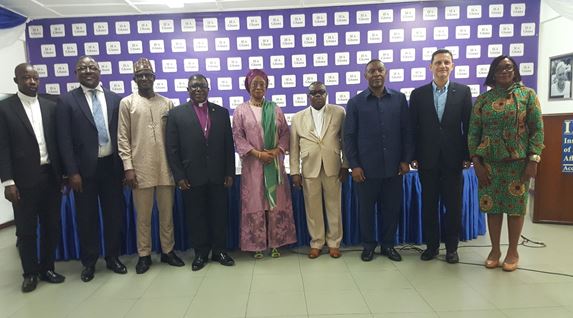By Buertey Francis BORYOR
The Institute of Economic Affairs (IEA) has inaugurated its 2024 Presidential Debates Committee (PDC), as part of its preparations to organise Presidential and Vice-Presidential debates and evening encounters.
The nine-member Presidential Debates Committee is carefully selected by the IEA and made up of eminent persons who have distinguished themselves in their various professions. The Committee’s purpose is to ensure the Institute holds credible debates and encounters in the run-up to the 2024 elections.
The Committee members are Her Ladyship Ms. Sophia A. B. Akuffo , Former Chief Justice and a Distinguished Fellow at the IEA as Chairperson; Most Rev. Dr. Paul Kwabena Boafo – Presiding Bishop, the Methodist Church of Ghana and President of the Africa Methodist Council as Alternate Chair.
The rest are Dr. Abubakar Mohammed Marzuq Azindoo – Personal Assistant to His Eminence the National Chief Imam; Dr. Humphrey Ayim-Darke, President-Association of Ghana Industries; Most Rev. Matthew Kwasi Gyamfi – Bishop of the Sunyani Diocese and President of the Ghana Catholic Bishops Conference; Mr. Salem Kifah Kalmoni – Managing Director-Japan Motors, Executive Director-Kalmoni Group of Companies and a member of the Ghana Islamic Society for Education and Reformation; Dr. Kwabena Nyarko Otoo – Director of Research and Policy at Trades Union Congress; Rev. Dr. Lawrence Tetteh – Founding President of the Worldwide Miracle Outreach and Lawrence Tetteh Ministries; as well as Rt. Rev. Dr. Daniel Sylvanus Mensah Torto – Diocesan Bishop, The Anglican Diocese of Accra.
The Committee’s mandate includes selection of presidential candidates to participate in the presidential debates; setting modalities; processing and approving questions; and selecting and approving questions for the debates.
The rest are short-listing moderators for selection and approval by campaign teams of the political parties; reviewing and approving the format and guidelines for the presidential and vice-presidential debates and evening encounters; reviewing and approving guidelines for the moderators; issuing press statements relating to the debates and encounters as needed; and undertaking other duties relevant to successfully conducting the 2024 debates and encounters.
Given the rich profiles of Committee members, Dr. Alberta Hagan, Senior Fellow-IEA, in her welcome address at the event was confident that they will effectively steer affairs of the debates and encounters to the utmost satisfaction of all.
The IEA is Ghana’s premier public policy institute based in Accra. Its objectives include- providing a platform for the exchange of ideas and promoting research and publication of economic, socio-political and legal issues in order to enhance the understanding of public policy among others.
IEA to host key presidential debates ahead of 2024 elections
The Institute had earlier said that the debates will serve as a crucial battleground for candidates vying for the nation’s top offices as they are designed to foster issue-based elections, and will cover a wide range of critical topics including the economy, governance, natural resources and social issues.
They offer a unique platform for candidates to present their plans and critique their opponents’ policies, providing voters with invaluable insights into each contender’s approach to solving Ghana’s pressing challenges.
“The debates will provide a common platform for the presidential candidates and vice-presidential candidates to discuss various aspects of the nation’s development process. It will be a form of policy dialogue engagement during which the candidates will have opportunity to present their viewpoints and plans, and also point out weaknesses in the policies of their co-contestants while presenting alternatives to those policies and programmes,” the IEA said in an earlier statement.
“The Electorate, on the other hand, will receive first-hand information on the programmes and plans of each candidate. Our moderators will pose questions to the candidates based on submissions received from the public on various thematic areas – including the economy, governance, natural resources, agriculture, education, health, labour, gender, children, youth and other social issues,” it added.
History
Presidential debates in the country began in 2000, when the IEA organised the country’s first-ever such event. This inaugural debate set a precedent, with absence of the ruling party’s candidate reportedly contributing to their electoral defeat.
The 2004 debate faced a setback when the incumbent, J.A. Kufuor, withdrew at the last minute despite earlier commitments. However, this did not deter the IEA from expanding the format in 2008. That year saw the introduction of ‘Evening Encounters’ – individual platforms for candidates – and the first-ever Vice Presidential Debate, acknowledging the second-in-command role’s importance.
A significant milestone was reached in 2012 when, for the first time, a sitting president participated in the debates alongside other candidates. This breakthrough helped establish the debates as an integral part of Ghana’s electoral process, breaking the cycle of incumbent avoidance. There were no debates in 2016 and 2020.
Over the years these debates have evolved from simple question-and-answer sessions to comprehensive policy dialogues, sometimes held in multiple locations across the country.










